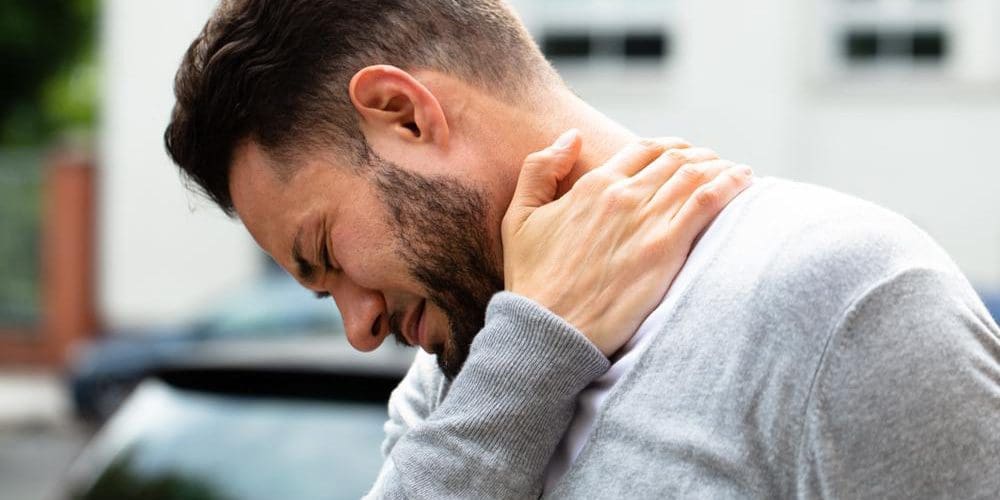
Chiropractic care for cervical radiculopathy is a safe and natural way to alleviate the pain and discomfort caused by the condition.
Chiropractic treatment is a popular and effective way to relieve the pain of cervical radiculopathy or a pinched nerve in the neck. Chiropractic adjustment improves the spine's alignment, allowing more efficient communication between your brain and your body. This reduces pressure on the nerves compressed by injury or poor posture, which can help reduce pain and inflammation.
Additionally, chiropractic treatment may include targeted exercises to help strengthen the muscles that support your spine, which can also help reduce your risk of future pinched nerve injuries.
Overall, chiropractic treatment is a safe and effective way to relieve the pain of a pinched nerve, and it can also help you prevent further injury in the future.
Cervical radiculopathy, also known as a pinched nerve in the neck, is where compressed nerves in your cervical spine send abnormal signals and pain to other parts of your body. It can cause weakness, numbness, tingling, or loss of function in your arm or hand.
Cervical radiculopathy is caused by a compressed cervical nerve root in your cervical spine, the part of your spine that connects your head and neck to your upper body. It can be due to several factors, including degenerative changes in the spine, a herniated disc, or arthritis. The symptoms of radiculopathy may develop slowly over time or come on suddenly.
Cervical radiculopathy is a serious and potentially long-term condition that can cause significant pain and discomfort, making it difficult to perform everyday activities.
Cervical radiculopathy is a type of pain caused by damage or irritation to the nerves in your cervical spine. This can result in various symptoms, including numbness, tingling, weakness, and pain that you can feel anywhere from your neck to your hand.
Pain associated with cervical radiculopathy can vary widely in intensity and location, depending on which nerve is affected. For example, you may experience pain primarily in your neck or upper back or it may be more localized to a smaller area, such as your hand or arm.

Sometimes, the pain will feel like an electric shock and come on suddenly and abruptly. In other cases, it may seem more like a dull ache radiating from your spine to your arm or hand.
Some symptoms associated with cervical radiculopathy may include chronic neck pain, headaches, numbness, arm pain, tingling sensations in the shoulders and hands, or muscle weakness. Several treatment options are available for this condition, including physical therapy and chiropractic care to help manage pain and discomfort.
Cervical radiculopathy is caused by a pinched nerve in the neck. When that nerve cannot send signals, there can be pain and weakness anywhere along its pathway. There are a few main causes of cervical radicular pain flare-ups:
Many different treatment options are available for addressing cervical radiculopathy, including chiropractic care. This approach focuses on correcting misalignments in the spine that have been linked to nerve compression and helping patients to alleviate their symptoms naturally through techniques such as cervical manipulation and massage therapy.

Through these methods, patients with cervical radiculopathy can effectively address their pain and discomfort and regain a greater sense of well-being. If you are experiencing any symptoms associated with this condition, consider seeking help from a qualified chiropractor to find relief and improve your quality of life.
Chiropractic treatments such as spinal adjustments, traction or decompression therapy, and exercises can often be very effective in providing relief for patients suffering from cervical radiculopathy.
There are several different methods that chiropractors may utilize to help relieve the pain of a pinched nerve, including:
Overall, there are many different methods that a chiropractor may use to help relieve the pain of a pinched nerve. By seeking treatment early on and making any necessary lifestyle changes, you can help promote healing and prevent future episodes of nerve compression from occurring.
When you have a pinched nerve in the neck, it can be very painful and uncomfortable. The first step in treating this condition is distinguishing between a pinched nerve and other causes of neck pain, such as muscle strain or arthritis.
To do so, your doctor may perform a physical exam and take X-rays or another imaging scan to determine what is causing the pain. Treatment for a pinched nerve in the neck will depend on its severity and how long it has been present. In some cases, resting the affected area can help alleviate symptoms, while more aggressive treatments, like physical therapy or cervical traction, may be warranted at other times.

© Accident Care Chiropractic | Hablamos Español
Located in: North Portland, NE Portland, SE Portland, Gresham, Clackamas, Oregon City, Hillsboro, Bethany, Beaverton, Tigard, Forest Grove, Woodburn,
McMinnville, Keizer, Salem, South Salem, Bend, Springfield, Vancouver, Hazel Dell, East Vancouver, Pasco, Kennewick, Lakewood.
We Specialize in Car Accident Treatment & Recovery
Home | About Us | Testimonials | Blog | Sitemap | Privacy Policy | Services | Locations | Contact Us